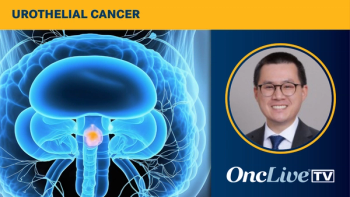
MIBC and mUC: Surgery, Systemic Therapy, and Bladder Preserving Treatments
Switching their focus to non-muscle-invasive bladder cancer (NMIBC), panelists identify the treatment armamentarium in this setting.
Episodes in this series

Transcript:
Shilpa Gupta, MD: Now we’ll switch gears to talk about the localized disease, muscle-invasive bladder cancer, and adjuvant and neoadjuvant therapy and what progress we’ve made. I’ll start with you, Mamta. For a typical patient with muscle-invasive bladder cancer, what do you consider when you’re seeing the patient in the clinic, and how do you triage for the treatment to offer, what referrals to make, or whether to consider clinical trials?
Mamta Parikh, MD, MS: There are 2 things I consider for patients I’m seeing with muscle-invasive bladder cancer. First, whether they are a surgical candidate, and that depends on their performance status as well as their willingness to undergo cystectomy, which is an important thing we should not underappreciate because it does have morbidity associated with it and affects the quality of life. And secondly, whether they are candidates to receive cisplatin-based chemotherapy. So that influences our treatment decisions.
For patients who are cisplatin candidates and are willing to undergo radical cystectomy, we consider neoadjuvant chemotherapy, and I highly favor clinical trials we have available for patients in that space, especially ones that are looking at bladder-sparing approaches even with the neoadjuvant chemotherapy approach. And for patients who are not cisplatin candidates but are surgical candidates I do sometimes consider cystectomy followed by adjuvant therapy. And finally, for patients who decline cystectomy or are not candidates for cystectomy, we consider trimodal therapy, and that involves both our urologist and our radiation oncologist to get an optimal TURBT [transurethral resection of bladder tumor] and involves the radiation therapists for combination approaches with chemotherapy and radiation. And we try to enroll patients in clinical trials when they’re available unless there is a compelling reason not to.
Shilpa Gupta, MD: Mamta, historically, only patients who were either unfit for surgery or had frailty were funneled for trimodality therapy because urologists are the ones who see the patient first. So in your practice, are you seeing more younger patients inquiring about bladder preservation even if they don’t meet those ideal criteria for bladder preservation?
Mamta Parikh, MD, MS: It’s really a balance, because muscle-invasive bladder cancer is something we have to take seriously. There is a very high risk of recurrence and progression to metastatic disease. It’s a real balance discussion about the risks and benefits of trimodal therapy vs surgery. We often have patients see both radiation oncologists and surgeons. I wish that I worked with a system like Petros has where you can have a poll in real-time multidisciplinary discussion with patients. But it is important for them to get both perspectives. Obviously, if you talk to a urologist, they will tell you that cystectomy is the only option. And if you talk to a radiation oncologist, they’ll tell you that radiation therapy is the best treatment. So it comes down to the individual patient and what they’re willing to undergo. And again, clinical trials are so important in this area because we may be on the cusp of getting to real bladder preservation for all our patients with muscle-invasive disease.
Shilpa Gupta, MD: And that is a task where we saw a lot of talk about these novel preservation approaches.
Transcript edited for clarity.









































